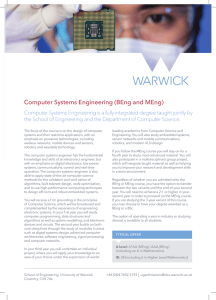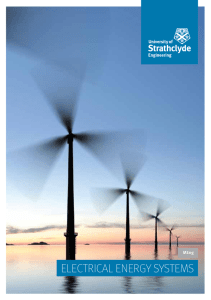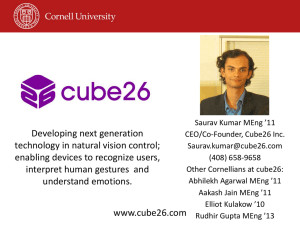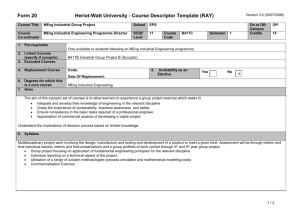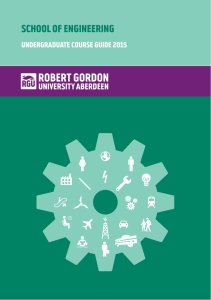ELECTRICAL and MECHANICAL ENGINEERING
advertisement
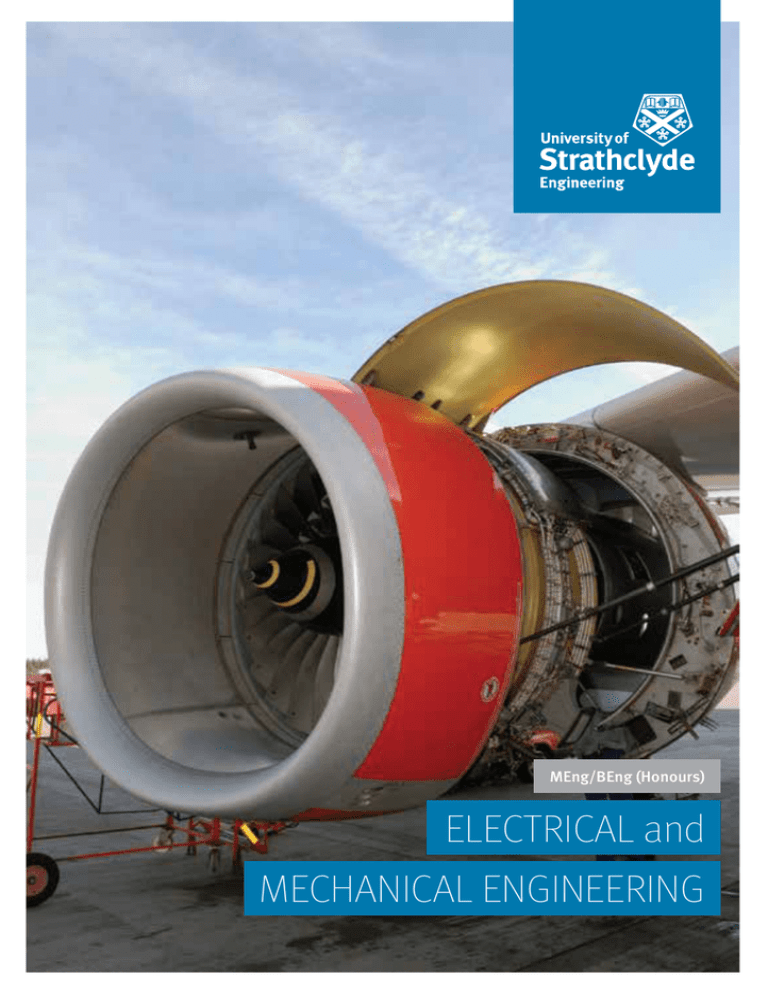
MEng/BEng (Honours) ELECTRICAL and MECHANICAL ENGINEERING MEng/BEng (Honours) ELECTRICAL and MECHANICAL ENGINEERING MEng ELECTRICAL and MECHANICAL ENGINEERING with INTERNATIONAL STUDY The needs of modern society and their potential environmental impact are presenting new challenges in engineering innovation. To meet these challenges, a diversity of skills and technology is required in the creation of new products and services. Nowhere is this more apparent than in the energy and transportation sectors. Global warming issues, increased demands on energy resources and a greater awareness of environmental and health issues have accelerated the need for energy efficiency and conservation, renewable energy sources, carbon footprint reductions, product recycling and waste processing. Mechanical, electrical, computing, microprocessor, sensor and control elements all form an integral part of modern engineering systems and a thorough understanding of these topics is essential for engineers working on the innovative technologies that society needs. Examples include renewable energy generation from wind and wave power, hybrid-electric and hydrogen-powered vehicles, and satellite and aerospace technologies. These courses are specially designed to equip the engineer of the future with the multidisciplinary skills and specialist training required to meet the challenges of the 21st century. Course Structure The degrees are taught jointly by the Departments of Electronic & Electrical Engineering and Mechanical & Aerospace Engineering. They reflect the multidisciplinary nature of modern engineering and the demand by industry for engineering graduates who are technically skilled and articulate within and across the traditional boundaries of mechanical and electrical engineering. The degrees are designed to produce graduates who are well-versed in the technical principles of electrical and mechanical engineering, with appropriate underpinning in maths and computer-aided design (CAD). Years 1 to 3 provide a strong foundation in the mathematics and technical principles behind electronics, and electrical and mechanical engineering. In Years 4 and 5 you choose specialist classes in electrical and mechanical topics. In Year 4 an individual project is undertaken in either, or both topics. MEng students may spend Year 4 studying abroad and overseas study opportunities are available within Europe, the USA, Canada, Australia and SE Asia. Students who complete Year 4 abroad are awarded the MEng with International Study. In Year 5 MEng students deepen their specialist knowledge and enhance their design and groupworking skills through a major group project. Transfer from BEng to MEng is possible within the first three years. Dual accreditation by the Institution of Engineering & Technology (IET) and the Institute of Mechanical Engineers (IMechE) ensures that graduates possess recognised skills and expertise to capitalise on career opportunities in either discipline. You will also gain ‘chartered’ (CEng) status with either of these professional bodies. Course Syllabus Year 1 –Core Engineering & Science Skills In Year 1, you are introduced to the analysis and design of analogue and digital circuits for electronics and power applications, supported by practical laboratory sessions. You also learn the physical principles underlying the design of mechanical systems and structures including topics such as dynamics, thermodynamics and fluid mechanics. Project work introduces students to design and build activities in, for example, fuel cells and hydrogen-powered vehicles. Numerical and modelling skills are developed through classes in mathematics and software engineering while your awareness of the engineering profession is enhanced through a special class that introduces engineering industry principles and practice. Year 2 – Core Engineering & Technology Skills Year 1 themes continue but at a more advanced level. You develop key skills for the engineering profession, including team working on practical design projects and oral presentation skills. Year 3 – Specialist Engineering Skills You develop specialist engineering skills through the following topics: Computer Aided Engineering Software Engineering Mathematical Methods for Engineering Analysis Signals and Systems Analysis Instrumentation and Microcontrollers Mechanical Systems in Motion Heat and Flow Integrated Design of Engineering Systems Engineering Innovation and Management Years 4 & 5 – Engineering for your Professional Future: Year 4 (BEng Honours) You undertake an individual project, through which you will gain valuable technical and project management skills. Specialist classes in the design and analysis of electro-mechanical systems will be undertaken, as well as a variety of optional topics such as: Communications Networks Microcontroller Applications Robotics Design Alternative Energy Systems Power System Analysis and Design Protection Control & Intelligent Systems Flight and Spacecraft Computer Aided Engineering Control Principles & Techniques Years 4 & 5 (MEng) In Year 4 you complete an individual project and in Year 5, a major group project that combines team-working, business management and engineering skills. These projects are supported by technical subjects in topics including: Information Transmission & Security Computer Aided Engineering Design Electronics for Energy Control High Voltage Technology Aerodynamic Performance and Propulsion Systems Machinery Diagnostics and Condition Monitoring Renewable Energy Systems Those on the International Study stream spend Year 4 studying at a partner university overseas. Teaching and Assessment A blend of student-centric methods, including interactive lectures, small group problem-solving tutorials, and practical laboratories as well as industrial visits and seminars by professional engineers, are used throughout all years of study. The programmes ensure that you develop not only technical engineering and computing expertise, but also, and equally importantly, communication, project management, leadership and entrepreneurial skills. There is a wide range of assessment methods, including assignments, examinations and individual and group-based projects. Both class delivery and assessment make use of web-based and multimedia facilities. The course typically consists of around 10 lectures, five tutorial/problem-solving classes and three practical classes per week. Students also undertake around 20 hours of self-study. The excellent reputation, opportunity to study abroad and the project-based learning of this degree were the reasons I chose it. My scholarship provided financial support and its work placements insight into the life of an engineer. These, combined with my Year 4 studies at Clemson University, USA, really impressed my employer – I now work at Jaguar Land Rover. Thomas Owen, MEng 2014 Transmission Calibration Team Jaguar Land Rover Scholarships and Work Placements The Department of Electronic & Electrical Engineering runs one of the UK’s largest industry-supported Scholarships Programme, providing annual bursaries of up to £5000, as well as help with books, software and paid summer internships with a range of well known, international organisations such as Rolls-Royce, ScottishPower and AMEC. We are the only Department in Scotland in the IET Power Academy and have been hand-picked by several leading global engineering organisations, such as BP and Siemens, to participate in their scholarship schemes. The Programme, which is open to electrical and mechanical engineering students, includes: S6 Bursaries – open to eligible S6 Scottish applicants Royal College Awards – a bursary for international applicants FM Bruce Scholarships AMEC Electrical Engineering Scholarship Lloyd’s Register Foundation Scholarship BP Scholarships IET Power Academy Engineering Excellence Scholarships with MacTaggart Scott, ScottishPower and Wood Group Through my IET Power Academy scholarship, on my summer placements, I gained insight into industry, developed project delivery skills and good future contacts. The exposure to a range of electrical and mechanical engineering fields was invaluable in helping me to discover my interests and in directing me down a career path. Rebecca Yuile, BEng (Hons) 2014 Graduate Programme Iberdrola Engineering & Construction Careers There is a continuing and growing demand for high quality Electrical and Mechanical Engineering (EME) graduates. Career opportunities where expertise in both electrical and mechanical technology is essential include: Contacts Academic Selector t: 0141 548 2097/2471 e:eee-ugadmissions@strath.ac.uk Find out more ... visit the University website at www.strath.ac.uk aeronautical engineering – design and operation of sensor and control systems and fly-by-wire technology automotive engineering – electronic performance management systems and pollution-free vehicles renewable energy sources using wind or wave power robotic systems for manufacturing and remote handling satellite and space exploration where efficient power sources, computing and control systems are essential marine engineering applications, including electric propulsion systems, radar and sonar systems Career opportunities also exist in non-technical areas as our graduates possess the first-rate numeracy, literacy, IT, problem-solving and team-working skills demanded by employers. Employers who have recruited our graduates include Rolls-Royce, ScottishPower, BP, Network Rail and Central Networks. the place of useful learning www.strath.ac.uk University of Strathclyde Glasgow G1 1XQ Information current at August 2014. Please consult the University website for the most up-to-date information. The University of Strathclyde is a charitable body, registered in Scotland, with registration number SC015263.
